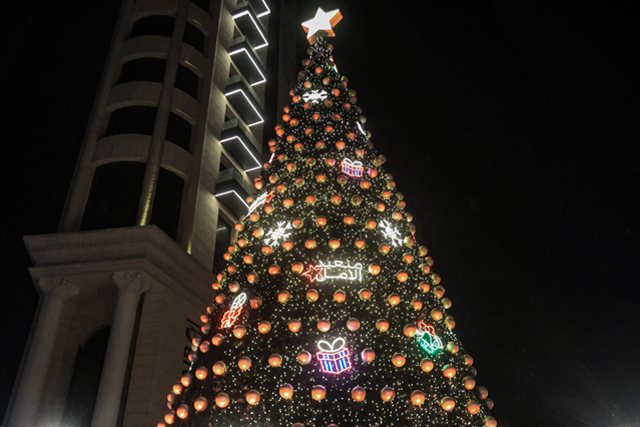You are here
Lebanon MPs again fail to fill vacant presidency
By AFP - Dec 08,2022 - Last updated at Dec 08,2022

A decoration in Arabic reading ‘restoring hope’ is lit up on the Christmas tree during the lighting ceremony in Sassine Square in the Ashrafieh district of Lebanon’s capital Beirut, on Wednesday (AFP photo)
BEIRUT — Lebanon’s divided parliament failed to elect a new president Thursday for a ninth time, despite the damage the political deadlock is doing to efforts to bail out its bankrupt economy.
Parliament is split between supporters of the powerful Iran-backed Hizbollah movement and its opponents, neither of whom have a clear majority.
“Holding a session every week won’t change anything,” said lawmaker Alain Aoun, of former president Michel Aoun’s Free Patriotic Movement (FPM).
Hizbollah opponent Michel Moawad, who is seen as close to the United States, won the support of 39 MPs but fell well short of the required majority.
Only 105 of parliament’s 128 lawmakers showed up for the vote and as many of them spoilt their ballots.
Some MPs wrote in mock choices for the vacant presidency, with one vote cast for late South African leader Nelson Mandela.
Moawad’s candidacy is opposed by Hizbollah, whose leader Hassan Nasrallah called last month for a president ready to stand up to Washington.
Parliament speaker Nabih Berri reiterated calls for dialogue among lawmakers to find a consensus candidate to prevent the process dragging on for months.
Aoun’s election in 2016 followed a more than two-year vacancy at the presidential palace as lawmakers made 45 failed attempts to elect a president before reaching a consensus on his candidacy.
By convention, Lebanon’s presidency goes to a Maronite Christian, the premiership is reserved for a Sunni Muslim and the post of parliament speaker goes to a Shiite Muslim.
A cabinet meeting on Monday exacerbated divisions between Hizbollah and its main Christian ally the FPM, which says the caretaker government should not meet until a new president has been named.
Lebanon can ill afford a prolonged power vacuum as it grapples with a financial crisis dubbed by the World Bank as one of the worst in modern history, with a currency in free fall, severe electricity shortages and soaring poverty rates.
The country’s caretaker government has limited powers and cannot enact the sweeping reforms demanded by international lenders to release billions of dollars in bailout loans.
Parliament will convene for a 10th attempt to elect a president on December 15.
Related Articles
BEIRUT — Lebanese lawmakers failed for a sixth time on Thursday to elect a successor to former president Michel Aoun, whose mandate expired
BEIRUT — Lebanon's parliament failed on Monday for a fourth time to elect a successor to President Michel Aoun, with lawmakers divided over
BEIRUT — Lebanese lawmakers failed for a seventh time on Thursday to elect a successor to former president Michel Aoun, even though the vaca














